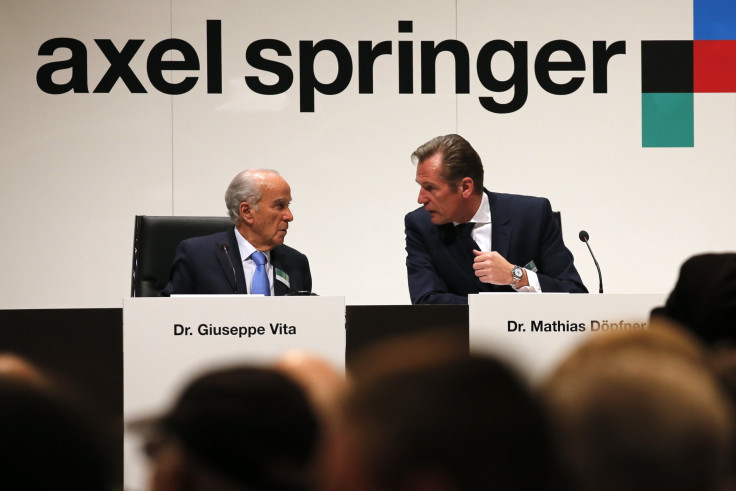What Is Axel Springer? German Newspaper Publisher Just Bought Business Insider In Anticipation Of Digital Shift

The barons of European media may not be quite as panicked as their American colleagues about the decline of print and the rise of digital, but German publisher Axel Springer seems to see the writing on the wall. Springer’s acquisition of Henry Blodget’s Business Insider for nearly $450 million on Tuesday is a self-conscious push into the digital media market.
The deal expands Axel Springer’s digital audience to nearly 200 million users thanks to Business Insider’s 76 million monthly unique visitors, the company said in a press release. That puts Axel Springer among the world’s six largest digital publishers “in terms of reach.”
This sale went better for Springer than its failed bid to purchase the Financial Times Group from Pearson earlier this year, in which it was beaten to the punch by the Japanese media empire Nikkei, which bought the FT for $1.3 billion.
Founded by Hamburg-born journalist and publisher Axel Springer (1912-1985), the company is known for its mass-market tabloid paper Bild and the more upscale newspaper Die Welt. It posted annual revenue of $3.42 billion last year, with net income of $265 million in 2014. Significantly, digital media revenue accounted for more than half of its returns in 2014, according to the company, up from 42 percent in 2012.
Apart from its financials, Springer lists on its site a philosophical mission statement ("corporate principles for a liberal worldview”), which stresses a commitment to the free market, an opposition to “totalitarism” and explicit support for the state of Israel -- a sensitive subject in Germany, with its Nazi past.
Number two on the list of principles is “[t]o promote the reconciliation of Jews and Germans and support the vital rights of the people of Israel.” Later on, the company pledges to “reject all forms of political totalitarism,” and finally, “to uphold the principles of a free social market economy.”
When reached for comment, Axel Springer referred International Business Times to its press release celebrating the sale. Blodget, Business Insider’s founder and CEO, did not respond to a request for comment.
Springer CEO Mathias Döpfner announced that the deal would grant Business Insider new bureaus, new verticals and, of course, new “content.”
"With the acquisition of Business Insider, we continue with our strategy to expand Axel Springer's digital reach and, as previously announced, invest in digital journalism companies in English-speaking regions of the world," Döpfner said in a statement.
“Combining our forces will allow us to unlock growth potential and expand Business Insider’s portfolio to new verticals, new locations and new digital content,” whatever that content happens to be.
Blodget, who told CNBC on Tuesday morning that he had never heard of Axel Springer when talks first came up last year, called the new partnership “a pleasure and a privilege.”
“We have tremendous respect for Axel Springer's commitment to independent journalism and its global vision for the future,” he said in the press release.
© Copyright IBTimes 2025. All rights reserved.





















